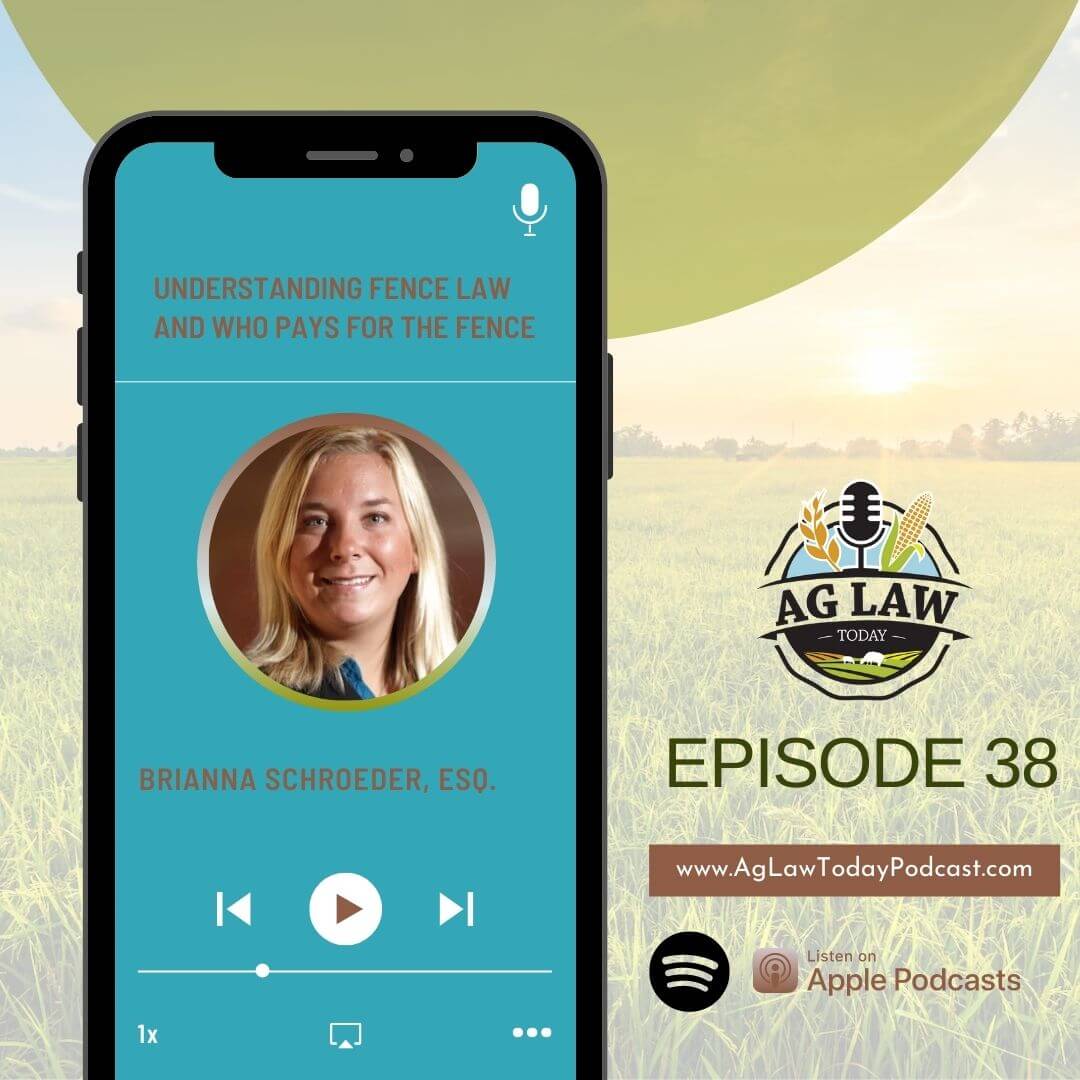
Understanding Fence Law and Who Pays for the Fence with Brianna Schroeder
Welcome Brianna Schroeder
Brianna is an Ag Law Attorney based in Indianapolis. Brianna grew up on a farm with her family.
What Inspired Brianna to Become a Lawyer?
Brianna really enjoyed school, reading, writing and the legal profession was an ideal fit for her. Ag Law allowed Brianna to combine her love for farming, reading, and writing.
What is Fence Law?
Back in the day when the United States became a country, there were two different concepts that applied to fencing; there was either fencing in or fencing out. Fencing in meant that if you have livestock, it is your responsibility to fence them in. However, in less populated areas, you would have to fence out (build a fence) to keep the livestock out.
Many midwestern states still have fence laws and these laws stipulate that property owners that are adjacent to each other must share the burden in constructing any fences between each other. The idea is that even if one person wants a fence because their property is being used for agriculture; usually the rule is when you both stand and look at each other where the fence is going to go, and you build your half side, and the neighbor builds their half side.
Things can get controversial between neighbors because the neighbor that is being forced into having a fence may not want one or be forced into paying for one. There are also statutes in place regarding how strong and tight the fence must be; essentially, it must be able to turn livestock.
Is it Fair to Force a Neighbor Adjacent the Agriculture Producer to Pay for the Fence?
Most of the fence law dates back to the late 1800s and early 1900s. Now that there are more rural residential areas, people are very split on this issue.
What is the Procedure to Get a Neighbor to Pay for Half a Fence?
Brianna mentioned that it can be a tense situation but what happens is the neighbor who wants a fence would have to build their half of the fence and send a written notice under the fence law to provide a specified time frame that the neighbor must build their side of the fence. Once the time frame has expired, then the matter can be taken to the township trustee.
The township trustee can nudge the other party to build their fence by sending a notice, however, if the other party still refuses to build their part of the fence, then the trustee can take it upon themselves to build the fence and charge it back via the county auditor’s office.
Brianna mentioned that “good fences make good neighbors.” The process to get to that fence can endanger relationships with the neighbor in the process.
Is it Worth it to Burn the Bridge with Your Farm Neighbor Over a Fence?
Brianna stated that for many people, it’s the principal part of it because they are supposed to pay for their half, they should under the black letter law.
Brianna suggests that before you make things official with a certified letter, walk over and have a conversation and explain why you need a fence, and see if you can come to an agreement. It’s a good feeling to know that at least you tried.
How Can a Client Determine if an Attorney Really Understands Agricultural Law?
Brianna shared some questions you can ask are:
1) What is your experience with Ag entities?
2) Do you have experience with county zoning?
3) Have you negotiated a solar lease before?
4) What does the engagement letter look like?
5) Is there a fee schedule?
6) Where will my documents be stored?
7) How does your law firm work day-to-day?
Connect with Brianna Schroeder
Connect with Brianna on LinkedIn
Brianna Schroeder Bio
Brianna grew up on a family farm in northeastern Indiana. She is an attorney with the firm, Janzen Agricultural Law LLC, and now focuses her legal practice working for farmers and agribusinesses. Brianna has litigated complex environmental and agricultural matters, including insurance coverage, regulatory compliance, tort claims, zoning appeals, and employment claims. Brianna also negotiates and drafts contracts for agricultural companies and farms, including farm leases, employment agreements, sales agreements, and privacy contracts. She is licensed in Indiana and Illinois and has represented a wide variety of clients from start-up companies and livestock farmers to large agricultural businesses, trade groups, and municipalities.